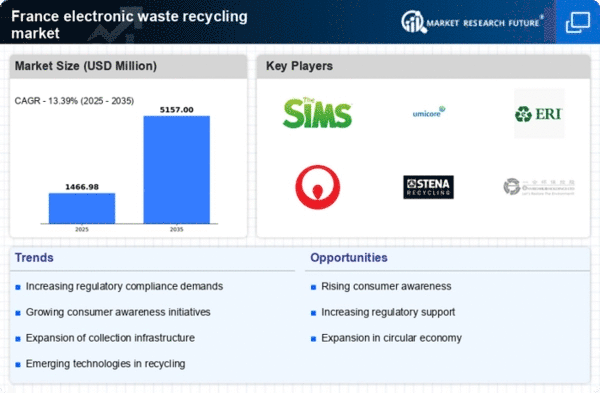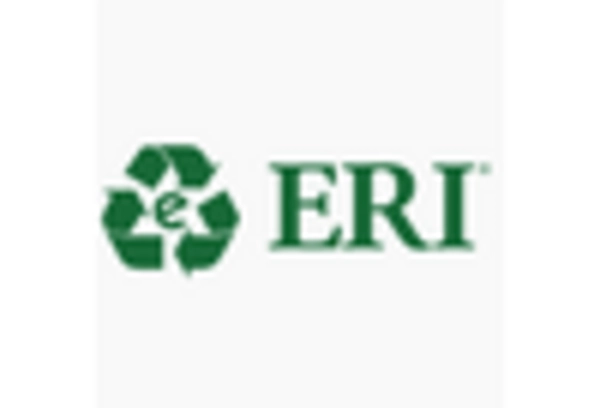Rising Environmental Concerns
Growing environmental concerns among the French population are significantly influencing the electronic waste-recycling market. As awareness of the detrimental effects of electronic waste on the environment increases, consumers are more inclined to support recycling initiatives. Reports indicate that approximately 70% of French citizens express concern over electronic waste pollution, prompting a shift in consumer behavior towards sustainable practices. This heightened awareness is likely to drive demand for recycling services, as individuals seek to responsibly dispose of their electronic devices. Consequently, businesses in the electronic waste-recycling market are adapting their strategies to align with these environmental values, potentially leading to a 25% increase in market participation by 2026.
Increasing Regulatory Compliance
The electronic waste-recycling market in France is experiencing a surge in regulatory compliance requirements. The French government has implemented stringent laws aimed at reducing electronic waste and promoting recycling. For instance, the Extended Producer Responsibility (EPR) mandates that manufacturers take responsibility for the entire lifecycle of their products, including end-of-life disposal. This regulatory framework encourages companies to invest in recycling initiatives, thereby driving growth in the electronic waste-recycling market. As of 2025, compliance with these regulations is expected to increase recycling rates by approximately 30%, reflecting a significant shift towards sustainable practices. Furthermore, non-compliance can lead to hefty fines, which further incentivizes businesses to adhere to these regulations.
Economic Incentives for Recycling
Economic incentives are emerging as a crucial driver for the electronic waste-recycling market in France. The government has introduced various financial mechanisms, such as subsidies and tax breaks, to encourage both consumers and businesses to participate in recycling programs. These incentives lower the cost barrier for recycling, making it a more attractive option for individuals and companies alike. For example, businesses that engage in responsible recycling practices may benefit from tax reductions of up to 15%. This financial motivation is likely to enhance participation rates in recycling initiatives, thereby contributing to the overall growth of the electronic waste-recycling market. As these economic incentives become more widely recognized, they could potentially lead to a 20% increase in recycling volumes by 2027.
Collaboration Between Stakeholders
Collaboration among various stakeholders is increasingly shaping the landscape of the electronic waste-recycling market. Partnerships between government agencies, private companies, and non-profit organizations are fostering a more integrated approach to electronic waste management. In France, initiatives that bring together these diverse entities are proving effective in raising awareness and improving recycling rates. For instance, joint campaigns have been launched to educate the public about the importance of recycling electronic devices, resulting in a notable increase in collection rates. This collaborative effort is expected to enhance the efficiency of recycling operations and could lead to a 15% growth in the electronic waste-recycling market by 2026. Such partnerships not only streamline processes but also create a more cohesive strategy for tackling electronic waste.
Technological Advancements in Recycling Processes
Technological advancements are playing a pivotal role in shaping the electronic waste-recycling market. Innovations in recycling technologies, such as automated sorting systems and advanced material recovery techniques, are enhancing the efficiency and effectiveness of recycling operations. In France, companies are increasingly adopting these technologies to improve recovery rates of valuable materials from electronic waste. For instance, the implementation of AI-driven sorting systems has been shown to increase recovery rates by up to 40%. This not only reduces the environmental impact of electronic waste but also makes recycling more economically viable. As these technologies continue to evolve, they are expected to attract further investment into the electronic waste-recycling market, fostering growth and sustainability.















